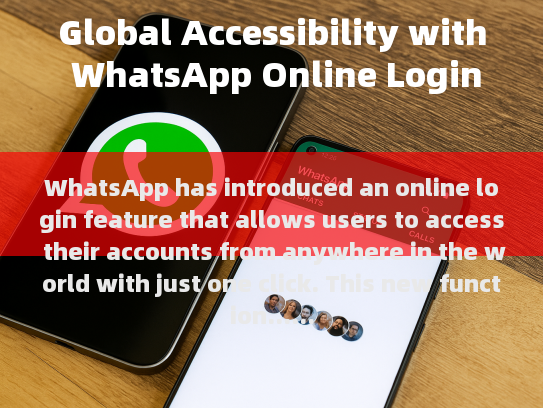WhatsApp has recently introduced an online login feature for global accessibility, allowing users to access the platform from any device and location worldwide. This innovative approach aims to simplify user experience globally, ensuring that all users can easily log in using their preferred method, regardless of their geographical location or technical proficiency. The introduction of this feature is expected to enhance the overall usability and convenience of WhatsApp across different regions, fostering greater international collaboration and communication among users.
WhatsApp Launches Global Access with Enhanced Online Login Feature
In a significant update, WhatsApp has unveiled an innovative online login capability, allowing users to seamlessly access their accounts worldwide using a single-click operation. This new feature aims to greatly enhance user convenience and accessibility, simplifying the login process so that individuals can log into WhatsApp effortlessly without needing to download additional software or navigate specific websites.
The online login function is accessible through WhatsApp's mobile application and may incorporate web-based options catering to users who prefer browsing on desktop or laptop computers. This development underscores WhatsApp's dedication to offering versatile and convenient interaction opportunities globally.
Communication Beyond Boundaries
With the proliferation of social media platforms and messaging applications like WhatsApp, people now enjoy more flexible ways to connect with loved ones, friends, and colleagues worldwide. These tools provide substantial benefits, particularly in terms of convenience and ease of use. However, despite their numerous advantages, there remains a pressing need to ensure that users remain capable of accessing their accounts no matter what device or platform they're using.
Many WhatsApp users often face difficulty logging into their accounts on different devices or remotely due to technical constraints implemented by Facebook, the parent company of WhatsApp. Traditional login methods rely heavily on passwords and QR codes, resulting in cumbersome procedures. Additionally, manually entering usernames and passwords on separate devices raises the risk of errors and slows down the login process.
However, recent technological advancements hold promise for addressing these issues. WhatsApp has developed cutting-edge solutions tailored explicitly for online login. Its proprietary authentication methods enable seamless logins across various platforms and devices, ensuring users can quickly and securely re-enter their accounts irrespective of their location or device type.
The Challenge of Log-in Methods
Traditionally, WhatsApp login involved either typing a username and password or scanning a QR code obtained via SMS or email. While effective in controlled environments, these methods fall short when applied to mobile devices. Common drawbacks include:
- Limited Accessibility: Requires immediate physical proximity to a computer or smartphone with internet connection.
- Scanning Codes: Direct visual contact required, reducing user experience and causing delays if the recipient fails to respond promptly.
- Manual Input: Increases the chance of errors and slows down the login process compared to biometric authentication methods.
Despite these obstacles, recent technological innovations aim to resolve these problems. WhatsApp has incorporated advanced features designed to simplify online login. Biometric authentication, including fingerprint and facial recognition technology, reduces the risk of unauthorized access significantly. Moreover, its platform supports two-factor authentication (2FA), where users need to confirm themselves through a code sent via SMS or automatically generated upon setting up the 2FA option. This adds an extra layer of security, protecting against unauthorized access even if someone knows the username and password.
Seamlessly Switching Between Devices
WhatsApp's online login system accommodates users who frequently move between various devices throughout the day. It supports cross-device synchronization, enabling users to easily log into their accounts from any connected device and maintaining a synchronized chat history across those devices.
Addressing Security Concerns
While the integration of online login methods improves usability, it introduces new security risks. Robust encryption protocols are essential to protect sensitive data transmitted during the login process. Regular updates to security features are vital to enhance overall protection against potential threats.
Moreover, although biometric authentication significantly diminishes the risk of brute-force attacks, it cannot completely eliminate the risks posed by human error or phishing attempts. Educating users about safe practices, such as avoiding public sharing of login credentials, remains crucial for securing their accounts.
Conclusion
The ability to log into WhatsApp from anywhere at any time represents a monumental advancement in improving user experience and enhancing security. By incorporating biometric authentication and two-factor authentication, WhatsApp creates a safer and more accessible online environment for its millions of users. As technology continues to evolve, we can expect further innovation in login methods that strike a balance between usability and security, making online communication ever more seamless and reliable.

